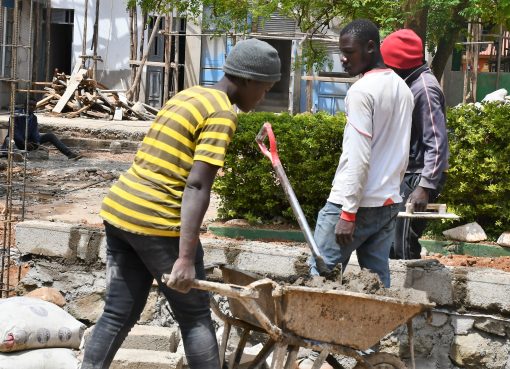He is visibly tired and looks hungry. He ruffles his unkempt hair unmoved by jostling crowds that are struggling in the cold drizzle rushing to get home before the 7pm curfew.
Meet the 27-year-old Wairegi, a homeless person at Nakuru’s Kenyatta Avenue whose survival has swiftly been thrust into jeopardy following the outbreak of Coronavirus (Covid-19) in the Country.
Barely 500 metres away at Oginga Odinga Avenue, rugged and grubby Ongosi stares at passersby’s with a stone cold gaze. Her weary movements do little to conceal the anguish she is going through.
In her own words, the 19-year-old street dweller avers that it is going to be another long night of uncertainty, fear and lack of sleep as all her sources of survival have been deflated creating a threat they believe to be more severe than the coronavirus; hunger!
The dusk to dawn curfew, closure of eateries, relocation of markets and bus stops as well as the limits on movement, are just some aspects of a terrifying scenario for street families in Nakuru as the pandemic shows no signs of slowing down.
“As night falls, street families remain in spaces that everyone is supposed to be getting out of. We do not have a permanent roof over our heads but depend on the streets as our homes. Most places where we sought food or shelter have now either been closed down or cordoned off by security personnel,” laments Wairegi.
Following slowed down business activity within the Central Business District, jobs that earned street dwellers a pittance, like carrying goods in markets or washing motor vehicles have vanished.
To Ongosi, their daily routine has been upset and their lives taken a downward spiral, a situation she says has been worsened by exposure to the harsh elements of weather due to closure of premises where street families sought refuge during wet and chilly nights.
“Our lives are fully dependent on begging for money, food or doing casual jobs to get money. For now the most pressing reality is the need for food. The police don’t want to see us around after 7pm. Are we going to die of hunger in place of coronavirus?
Most eateries have scaled down operations or closed down altogether and now we cannot get leftover food they usually gave us. Most streams of income that street families have been exploiting have been blocked by the outbreak and spread of this disease,” she stated
Nevertheless, there is a glimmer of hope for street families after County Executive Committee Member for Youth, Gender, Culture and Social Services Engineer Lucy Kariuki announced a raft of measures to ensure that street families are given priority in access to food, health care and medical supplies in the wake of coronavirus (Covid-19) pandemic.
She said a committee comprising of stakeholders drawn from the devolved unit, the National Government, Faith based and Community organizations and NGO’s had formulated interventions that will guarantee a level playing ground, devoid of stereotyping and prejudice for street families in the fight against the disease
“The Committee has come up with a profiling and placement subcommittee which will handle the provision of humanitarian assistance being implemented by the National and County Governments. It will oversee provision of temporary shelters and provision of facemasks and hand sanitizers to street families.
We urge residents to link up with the County Directorate of Social services when visiting the street families,” said Engineer Kariuki.
The CEC said the Committee was in the process of identifying possible homes for street families by utilizing available other public facilities such as social halls.
“The Menengai Social hall has been identified as a drop point where street families will be receiving their meals. The programmee incorporates rehabilitation to foster homes, integration with their families and sponsoring others to complete their studies. The COVID-19 pandemic has had devastating effects to the street families who have been streaming into Nakuru from neighboring Counties,” noted the CEC
Governor Lee Kinyanjui said that his administration is treating street families as persons with potential who are facing tough challenges. He acknowledged that the group had borne the greatest brunt of ‘social and economic’ shocks following reduced activity caused by outbreak and spread of Covid-19 disease.
“We need to deal with the realities of their existence rather than just wish these children away. Although their unity is their greatest strength, it may also be their greatest enemy as efforts of social distancing prove to be difficult in the nooks they call home,” observed GovernorKinyanjui.
By JaneNgugi





